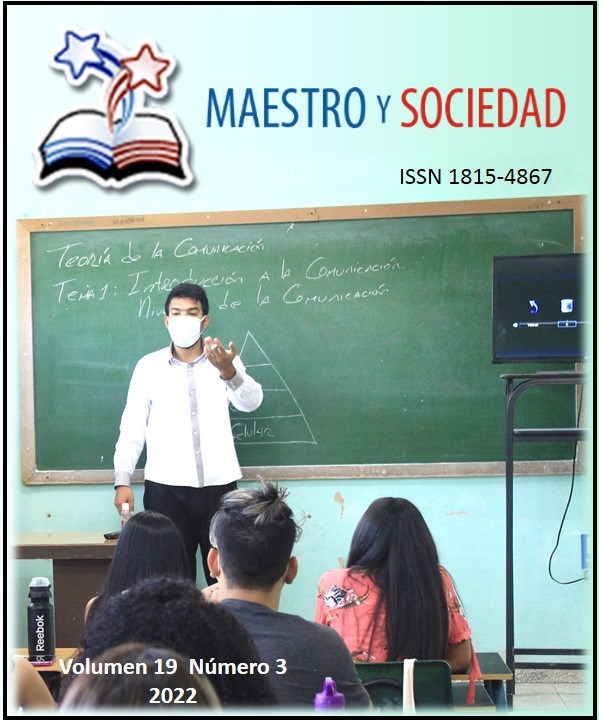Analysis of the teaching digital competences of the Tecnoecuadorian Higher Technological Institute
Analysis of the teaching digital competences of the Tecnoecuadorian Higher Technological Institute
Keywords:
competencies, digital, ICTAbstract
The objective of this research work is to analyze the level of digital skills and as well as how these in turn favor the teachers of the Tecnoecuadorian Higher Technological Institute, the importance and significance of training in the digital field is highlighted in order to face the new paradigms of education by having to integrate ICT as a mediator of knowledge. The methodology is field and bibliographical with its mixed qualitative and quantitative approaches. The total population under study is 98 participants between teachers and students and the observation technique is used and therefore the survey as an instrument for collecting information. According to the results, most of the teachers find it difficult to use some technological tools and the students, for their part, demand the commitment and use of these technologies.
References
Abreu, O., Naranjo, M. E., Rhea, B. y Gallegos, M. (2016). Modelo Didáctico para la Facultad de Ciencias Administrativas y Económicas de la Univ. Técnica del Norte de Ecuador. Form. Univ., 9(4), 3-10.
Addine, F. et al. (1998). Didáctica y optimización del proceso de enseñanza-aprendizaje. Instituto Pedagógico Latinoamericano y Caribeño.
Addine, F. et al. (2004). Didáctica Teoría y Práctica. Ed. Pueblo y Educación.
Aebli, H. (1958). Una didáctica fundada en la psicología de Jean Piaget. Kapelusz.
Álvarez, C. M. (1993). La escuela en la vida, didáctica. Ed. Pueblo y Educación.
Álvarez, R. M. (1997). Hacia un curriculum integral y contextualizado. Académica.
Alves, L. (1962). Compendio de Didáctica General. Kapeluz.
Carneiro, R., Toscano, J. C., & Díaz, T. (2010). Los desafíos de las TIC para el cambio educativo. Fundación Santillana.
Benedito, V. (1987). Introducción a la didáctica. Barcanova.
Blankertz, H. (1981). Didáctica. Conceptos Fundamentales de Pedagogía. Herder.
Buyse, R. (1964). La experimentación pedagógica. Labor.
Camilloni, M. C., et al (1994). La formación docente en cuestión: política y pedagógica, Paidós, 1-141, Buenos Aires, Argentina.
Carvajal, M. (1990). La didáctica en la Educación. Fundación Academia de Dibujo Profesional.
Contreras, J. (1990). Enseñanza, currículum y profesorado. Introducción crítica a la didáctica. Ed. Akal S. A.
Díaz, H. (2001). La didáctica universitaria: una alternativa para transformar la enseñanza. Acción Pedagógica, 10(1-2), 64-72.
Díaz, D. (1999). La didáctica universitaria: Referencia imprescindible para la enseñanza de calidad. Revista Interuniversitaria de formación del profesorado, 2(1), 1-10.
Estoker, K. (1964). Principios de Didáctica Moderna. Kapelusz.
Fernández, J. (1970). Diccionario de Pedagogía. Labor.
Fernández, A. y Sarramona, J. (1984). La educación constante y problemática actual. CEAC.
Fuentes, H. (2000). Didáctica de la educación superior. INPAHU.
Gervilla, E. (2000).Valores de la educación integral. Revista Bordón: Revista de Orientación Pedagógica, 52(4). https://goo.gl/E6q9JM, 523-536
Gottler, J. (1962). Pedagogía sistemática. Herder.
Herbart, J. F. (1935). Pedagogía general derivada del fin de la educación. Espasa-Calpe.
Madrid, D. y Mayorga, M. J. (2010). ¿Didáctica General en y para Educación Social? Puntos de encuentro desde la perspectiva del alumnado. Revista Educación Siglo XXI, 28(2) 245-260. http://revistas.um.es/educatio
Mallart, J. (2001). Didáctica. Concepto, objeto y finalidades. Didáctica General para Psicopedagogos. UNED.
Moreno, T. (2011). Didáctica de la Educación Superior: nuevos desafíos en el siglo XXI. Revista Perspectiva Educacional, 50(2), 26-54.
Nérici, I. (1973). Hacia una Didáctica General Dinámica. Kapelusz.
Ormrod, J. E., Sanz, A. J. E., Soria, M. O., & Carnicero, J. A. C. (2005). Aprendizaje humano. Pearson Educación.
Pacios, A. (1982). Introducción a la Didáctica. Cincel-Kapelusz.
Pérez, A. (1982). Investigación en el aula y paradigma ecológico. I Simposio Internacional de Didáctica General y Didácticas Especiales.
Pla, R. et al. (2010). Una concepción de la Pedagogía como ciencia desde un enfoque histórico cultural. Ed. Pueblo y Educación.
Rosales, C. (1988). Didáctica, Núcleos fundamentales. Narcea.
Sacristán, J. G. y Pérez, A. (1988). La enseñanza: su teoría y su práctica. Akal.
Tapia Tapia, T. M. (2022). Incidencia de las TIC como herramientas metodológicas en el proceso enseñanza aprendizaje. (s.e.).
Tapia, E. V., Reyes, N. C. y Tapia, Y. A. (2022). Docente-investigador productor de textos digitales en contextos de apropiación de tecnologías digitales. (s.e.).
Titone, R. (1970). Metodología didáctica. Editorial RIALP.
Ul Haq, M. (1995). El paradigma del desarrollo humano. www.desarrollohumano.cl/pdf/1995/paradigma95_2.pdf.
Vasco, C. E. (1990). Algunas reflexiones sobre la pedagogía y la didáctica. (s.e.).
Villalpando, J. M. (1970). Manual de Didáctica. Ed. Porrúa.
Published
How to Cite
Issue
Section
License
Copyright (c) 2022 Elsa Josefa Pezo-Ortiz

This work is licensed under a Creative Commons Attribution-NonCommercial-NoDerivatives 4.0 International License.
This journal provides immediate open access to its content, based on the principle that offering the public free access to research helps a greater global exchange of knowledge. Each author is responsible for the content of each of their articles.



























 Universidad de Oriente
Universidad de Oriente 